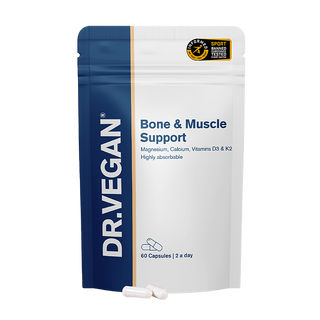Gum disease and the oral microbiome

By: Shona Wilkinson
The health of your mouth is more than just shiny teeth and fresh breath - your oral health can be a window into your overall health and wellbeing. Maintaining and supporting good oral health can reduce the risk of developing health issues including infections and chronic conditions.
What is the oral microbiome?
The oral cavity, otherwise known as our mouth, is home to a vast and diverse ecosystem known as 'the oral microbiome'. After the gut, the oral microbiome is the second-largest microbial community in humans and is crucial in maintaining overall health.
The oral microbiome consists of various microbial groups that inhabit different areas of mouth, including the teeth, tongue, cheeks, gingiva (gums), palates and tonsils. This complex microbial community provides important support for our digestion, nutrient absorption, immune system development, and maintaining oral health. Signs of an unhealthy oral microbiome include bad breath, mouth ulcers, plaque on your teeth and gum disease.
What's your diet missing? Create your free Diet Profile.
What do gums say about your health?
Our gums can reveal important clues about our overall health. Healthy gums are firm, pink and have a tight seal around the teeth. If you notice signs such as redness, swelling, tenderness, bleeding or receding gums, it may be a sign of gum disease or gingivitis. Gum health is not only essential for a beautiful smile but also for your overall wellbeing. Poor gum health may indicate nutrient deficiencies, and an easy way of finding out if your diet is lacking key nutrients is by completing your free online Diet Profile - it only takes 3 minutes.
Gingivitis
Gingivitis is the early stage of gum disease and is characterised by inflammation of the gums or swollen or infected gums. It is caused by plaque build-up on the teeth and gum line. Plaque is a sticky coating that contains bacteria. When not removed, plaque can irritate the gums, leading to inflammation, redness, swelling, tenderness and bleeding gums.
Daily Multi-Vitamin

Periodontal disease and Periodontitis
If left untreated, gingivitis can progress into 'periodontal disease' or 'periodontitis', also known as gum disease. Periodontal disease is a more advanced stage of gum disease characterised by the destruction of the supporting structures of the teeth. In addition to inflammation, periodontitis involves the formation of pockets between the gums and teeth, which can become infected. The body's immune response to the infection, combined with the toxins released by bacteria, can cause further damage to the gums, bone and connective tissues that hold the teeth in place.
Periodontal disease can lead to symptoms such as persistent bad breath, receding gums, loose teeth, changes in the bite and gum abscesses. If not treated promptly, it can result in tooth loss and may have systemic health implications, as the bacteria from the infected gums can enter the bloodstream and affect other body parts.
What causes gum disease?
Gum disease, periodontal disease or periodontitis, are a common oral health condition affecting both the gums and supporting structures of teeth. They are mainly caused by plaque build-up on the teeth and around the gum line. Plaque is a sticky coating that contains bacteria and can harden into tartar if not removed through brushing.
If left untreated, gum disease can progress and lead to more severe oral health problems, including tooth loss and systemic health issues including cardiovascular disease and diabetes. Signs of gum disease include swollen or infected gums, persistent bad breath, loose teeth, gum recession and gum abscesses.
You may also enjoy reading 'Mistakes to avoid on a plant-based diet'.
Bone & Muscle Support

Can probiotics help gum disease?
Probiotics are beneficial bacteria that can help restore and maintain a healthy balance in the oral microbiome. After the gut, the oral cavity is the largest host of bacteria. The mouth houses over 700 bacterial species, which puts it in second place to the gut for bacterial diversity. Like in the gut, these bacteria can be beneficial or pathogenic and the balance affects the function and health of the mouth.
Recent studies have shown promising results regarding probiotics in addressing gum disease. Probiotics can work by inhibiting the growth of harmful bacteria and reducing inflammation in the gums. While probiotics for gut health and IBS should be in a delayed release capsule so they reach the gut, you can also open and mix the contents of a Gut Works® capsule into a glass of water and use it as a mouthwash. The healthy active bacteria, over time, will fight the bad bacteria to help overcome bleeding gums and cavities. Gut Works®, which is an award-winning probiotic with 50bn CFU, combines prebiotics with 6 clinically studied probiotic strains.
While probiotics can be a valuable addition to traditional gum disease treatments, if you're suffering gum disease it is important to book and appointment with your dentist.
Final note
The oral microbiome is a complex ecosystem vital to maintaining oral health and wellbeing. Gum disease is a common condition with serious consequences if left untreated. By using good oral hygiene practices, seeking professional care and using probiotics, you can promote a healthy oral microbiome and safeguard your oral health for years to come. Remember, a healthy smile starts with a healthy mouth!
Discover our range of award-winning vegan supplements and probiotics.
You may also enjoy reading:
- How to naturally improve digestion
- Latest gut health research: IBS causes & symptoms revealed
- Why you should improve your gut health
- 6 signs of an unhealthy gut
- Why is bone health so important in menopause?
- How to Look After Your Gut Through Your Diet
Want to hear more from our nutritionists? Sign up to our email newsletter for insights and exclusive offers:


















